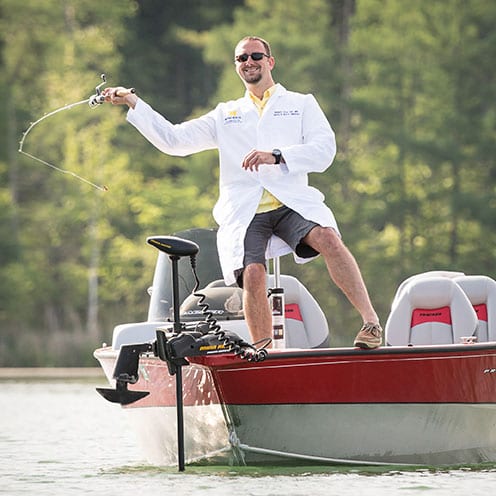
The first smooth cast of his line into Bill’s Lake in Newago is a celebration every spring for life-long angler Ken Dood, DO, who is also a primary care and sports medicine physician at Metro Health – University of Michigan Health in Wyoming.
“It’s like a holiday,” Dood exclaimed. “I’ve been bass fishing with my dad and grandparents my whole life, and nothing beats the first catch of the season.”
Dood’s family owns a cottage on Bill’s Lake and has for decades. “I remember as a kid, we fished from an aluminum boat with a wire fish basket that hung over the side. Now, we’re fishing from a bass boat with a live well. The gear has been upgraded, but we caught just as many fish back then as we do now. We’re just more comfortable these days.”
Dood hits the lake at first light and fishes until mid-day, nearly always reeling in the five-bass limit. “I make sure I eat what I catch,” he emphasized. “Most of the time it’s bass or blue gill.”
Before his boat leaves the dock, however, Dood makes sure he has more than just a rod and tackle box. “One of the most common injuries while fishing is accidently hooking yourself or someone else. I recommend preparing for that possibility and getting your tetanus shot before heading out.”
As a physician, Dood recommends a “safety tackle box” as well. He suggests packing a basic first aid kit to clean and cover a hook injury, as well a cell phone in case you need to call for help. “Make sure you have proper footwear in the event you step on a hook, or you can avoid that problem altogether if you remember to put hooks away. Keeping your tackle box organized will also decrease your chances of reaching in and snagging yourself.”
If you do sustain a hook injury that penetrates deeply into the skin, Dood suggests cleaning the wound as soon as you can with clean water or wound wash, which can be purchased at most drug stores. From there, go to the nearest urgent care center or emergency room.
When you are fishing with someone else, be aware of where they are casting, and if you’re alone, tell someone on shore where you plan to go and how long you plan to stay out. “Those may be simple things, but when you take safety seriously, you’ll ensure every fishing trip ends well,” he added.
Some other things to consider in your safety tackle box include drinking water, extra rope, a flashlight, sunglasses and sunscreen.
“There’s nothing inherently dangerous about fishing, so if you’re smart, you’ll go home happy, at least from a safety standpoint. Catching fish is never a guarantee,” Dood laughed. But as the old saying goes: A bad day fishing is better than a good day working.
